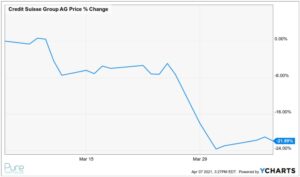“How did you go bankrupt?” “Two ways. Gradually, then suddenly.” – Ernest Hemingway, The Sun Also Rises.
It takes talent to lose $8 billion dollars in 10 days, but that’s exactly what happened to Bill Hwang’s family office, Archegos Capital Management.
Some are calling the fiasco the greatest destruction of personal wealth (maybe) ever.
The story reads like the nonfiction thrillers “The Big Short,” “Wolf of Wall Street” or “Liar’s Poker.”
Here’s the backstory…
Bill Hwang quietly amassed his fortune working in the hedge fund industry. By 2000, he was running his own fund, Tiger Asia Management. Hwang eventually was busted by the SEC for insider trading and had to pay a $44 million fine.
He did what any banished hedge fund manager would do. Start a family office.
In 2013, Tiger Asia became Archegos Capital Management.
Bill Hwang is not alone. Over the past several years, many hedge funds have shuttered amidst regulatory scrutiny, lower returns, fee compression, and the pressures of dealing with outside investors.
Other hedge funds have opted to convert to family offices, which are private and focus on managing wealth for a single family vs. outside investors. According to the Financial Times, family offices manage ~$6 trillion in assets, nearly 2x the hedge fund industry.
Regulatory requirements for family offices are virtually non-existent. Dan Berkovitz, commissioner of the Commodity Futures Trading Commission (CFTC), believes the current disclosure requirements are totally insufficient.
“The information required would fit on a Post-it note. The annual cost of the filing is merely $28.50.” (source: Financial Times)
Family offices are private, secret affairs. Regulation is minimal. Bad actors, shunned by the SEC, can repurpose their hedge funds to family offices with little resistance. The perfect storm.
What could go wrong?
If you’re Bill Hwang (and a handful of global banks), everything.
Archegos borrowed billions of dollars from various banks to build a leveraged and concentrated stock portfolio. It was tough to track Archegos’ exposure because it was done through complex derivatives.
One of the biggest positions, ViacomCBS, fell quickly and the banks demanded money. Archegos couldn’t pay, the banks seized Archegos’ stocks, and they were forced to sell huge blocks of shares in the open market at steep discounts.
The ripple effects are still playing out…

Source: YCharts
The above chart shows the performance of Credit Suisse (CS) over the past month. The investment bank is rumored to have lost between $8-10 billion. Executives and risk managers were fired. It’s amazing how large financial institutions time and again are blinded by profits and greed.
Archegos Capital Management had a spectacular implosion. It’s estimated Bill Hwang lost the majority of his $10 billion fortune.
There are lessons woven into this story, many of which we have discussed in prior blogs.
Taking risks where the best case won’t change your life, but the worst case can ruin you is foolish.
Finding your enough. The mindset for getting rich and staying rich are completely different.
Failing to understand your portfolio’s range of potential outcomes can lead to disaster. I doubt Hwang would have signed off on “you could be worth $25 billion by year-end, but you could also be wiped out.”
Leverage amplifies potential outcomes, both good and bad.
Simple beats complex. When it comes to investing, boring is often a good thing.
The thing that derails financial markets is seldom what we see coming. We can’t know the unknowable. The thing you’re worried about or that everyone is talking about is probably already reflected in current prices. Recent examples include the election, inflation, trade war w/China, Georgia run-off, etc. It’s the unknown that will get you, which is reason #156 that having absolute convictions about what the market is going to do next is dangerous.
